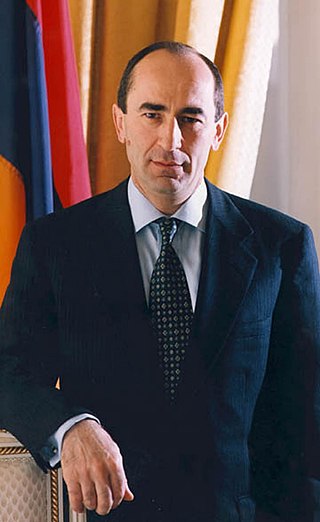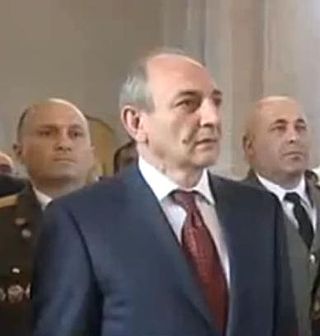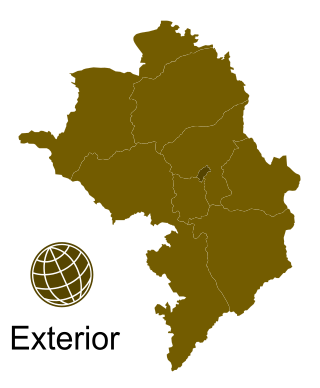
Robert Sedraki Kocharyan is an Armenian politician. He served as the President of the Nagorno-Karabakh Republic from 1994 to 1997 and Prime Minister of Nagorno-Karabakh from 1992 to 1994. He served as the second President of Armenia between 1998 and 2008 and as Prime Minister of Armenia from 1997 to 1998.

Artsakh, officially the Republic of Artsakh or the Republic of Nagorno-Karabakh, was a breakaway state in the South Caucasus whose territory was internationally recognised as part of Azerbaijan. Between 1991 and 2023, Artsakh controlled parts of the former Nagorno-Karabakh Autonomous Oblast of the Azerbaijani Soviet Socialist Republic, including its capital Stepanakert. It had been an enclave within Azerbaijan from the 2020 Nagorno-Karabakh war until the 2023 Azerbaijani offensive, when the Azerbaijani military took control over the remaining territory controlled by Artsakh. Its only overland access route to Armenia after the 2020 war was via the five kilometres (3.1 mi)–wide Lachin corridor, which was placed under the supervision of Russian peacekeeping forces.

Politics of Artsakh took place within the constraints of a written constitution, approved by a popular vote, that recognises three branches of government: executive, legislative and judicial. The executive branch of government was exercised within a framework of a presidential representative democratic republic, whereby the President of Artsakh was both the head of state and the head of government. The legislative branch of government was composed of both the Government and the National Assembly. Elections to the National Assembly were on the basis of a multi-party system. As of 2009, the American-based non-governmental organisation, Freedom House, ranks Artsakh above both Armenia and Azerbaijan in terms of political and civil rights. The republic was de facto independent and de jure a part of Azerbaijan. None of the elections in Artsakh were recognised by international bodies such as the OSCE Minsk Group, the European Union or the Organisation of Islamic Cooperation. Both Azerbaijan and Turkey had condemned the elections and called them a source of increased tensions.

The National Assembly of the Republic of Artsakh was the legislative branch of the government of the Republic of Artsakh.

The Republic of Artsakh was a republic with limited recognition in the South Caucasus region. The Republic of Artsakh controlled most of the territory of the former Nagorno-Karabakh Autonomous Oblast. It was recognized only by three other non-UN member states, Abkhazia, South Ossetia and Transnistria. The rest of the international community recognized Artsakh as part of Azerbaijan. In November 2012, a member of Uruguay's foreign relations committee stated that his country could recognize Nagorno-Karabakh's independence. In 2012, Armenia and Tuvalu established diplomatic relations, which led to speculation of possible recognition of Artsakh by Tuvalu. In October 2012, the Australian state of New South Wales recognized Nagorno-Karabakh. In September 2014, the Basque Parliament in Spain adopted a motion supporting Artsakh's right to self-determination and in November 2014, the Parliament of Navarre, also in Spain, issued a statement supporting Artsakh's inclusion in taking part in settlement negotiations.

Presidential elections were held in the Nagorno-Karabakh Republic on 19 July 2007. Incumbent president Arkady Ghukasyan was constitutionally barred from seeking a third term and endorsed Bako Sahakyan, who was the head of the National Security Service. Sahakyan was supported by the ruling Democratic Party of Artsakh, two opposition parties and the Armenian government.

Bako Sahaki Sahakyan is an Armenian politician who served as the third president of the de facto-independent Republic of Artsakh from 2007 to 2020. He is the longest-serving president of Artsakh.

Arayik Vladimiri Harutyunyan is an Armenian politician who served as the fourth president of the Republic of Artsakh from May 2020 to September 2023. Under his predecessor Bako Sahakyan, he served as the sixth and last Prime Minister from 2007 until the abolishment of that position in 2017 and as the first State Minister of the Republic of Artsakh from 2017 until his resignation in 2018. Harutyunyan led Artsakh through the 2020 Nagorno-Karabakh War with Azerbaijan, during which the republic lost most of the territory under its control. He resigned on 1 September 2023 in the midst of the Azerbaijani blockade of Nagorno-Karabakh.

The following outline is provided as an overview and topical guide of the Republic of Artsakh and Nagorno-Karabakh region:
This page lists in alphabetical order articles related to the Republic of Artsakh and Nagorno-Karabakh region. For a topically arranged list of articles, please see Outline of the Republic of Artsakh.

The Bishkek Protocol was a provisional ceasefire agreement, signed by the representatives of Armenia, Azerbaijan, the unrecognized Republic of Artsakh, and Russia on May 5, 1994, in Bishkek, the capital of Kyrgyzstan.

Parliamentary elections were held in the Nagorno-Karabakh Republic on 23 May 2010.

The Constitution of the Republic of Artsakh was the basic law of the Republic of Artsakh. It was approved by the people of Artsakh in a referendum that was held on 20 February 2017. It superseded the constitution previously ratified by the people in 2006. Over 76.5% of the electorate participated in the 2017 referendum. Of these, over 90% voted for its adoption, with just under 10% voting against its adoption. This constitution proclaimed the Nagorno-Karabakh Republic to be a sovereign, democratic state that was based on social justice and the rule of law. The constitution stated that the names "Republic of Artsakh" and "Republic of Nagorno-Karabakh" were synonymous. The constitution affirmed that all power is vested in its citizens, who exercise it directly through constitutional referendums and indirectly through their elected representatives. Proposed changes to the constitution or to an alteration of the borders of the State had to be ratified by the people in a referendum. Stepanakert was defined as the state's capital. As a result of the Azerbaijani offensive, the constitution was repealed when on 28 September 2023, the president of Artsakh subsequently signed a decree to dissolve all of the republic's institutions by 1 January 2024, under article 93, bringing its existence to an end.

United Nations General Assembly Resolution 62/243, titled "The Situation in the Occupied Territories of Azerbaijan", is a resolution of the United Nations General Assembly about the situation in Nagorno-Karabakh, which was adopted on March 14, 2008 at the 62nd session of the General Assembly. It became the seventh United Nations document concerning Nagorno-Karabakh and the third and last United Nations General Assembly document on it.

Presidential elections were held in Nagorno-Karabakh on 19 July 2012. Incumbent President Bako Sahakyan was re-elected for a second five-year term, receiving around two-thirds of the vote.

The political status of Nagorno-Karabakh remained unresolved from its declaration of independence on 10 December 1991 to its September 2023 collapse. During Soviet times, it had been an ethnic Armenian autonomous oblast of the Azerbaijan Soviet Socialist Republic. Following the dissolution of the Soviet Union, a conflict arose between local Armenians who sought to have Nagorno-Karabakh join Armenia and local Azerbaijanis who opposed this.

The 2016 Nagorno-Karabakh conflict, also known as the Four-Day War, April War, or April clashes, began along the former Nagorno-Karabakh line of contact on 1 April 2016 with the Artsakh Defence Army, backed by the Armenian Armed Forces, on one side and the Azerbaijani Armed Forces on the other.

General elections were held in the Republic of Artsakh on 31 March 2020, with a second round of the presidential election on 14 April. Voters elected the President and 33 members of the National Assembly. It was the first time the President and National Assembly were elected at the same time.

Indirect presidential elections were held in the unrecognised Republic of Artsakh on 19 July 2017. The incumbent, Bako Sahakyan, was elected to a third term.
During its existence, the Republic of Artsakh and the United States did not have official diplomatic relations as the United States was among the vast majority of countries that did not recognize Artsakh as a sovereign nation and instead recognized the region of Artsakh, or Nagorno-Karabakh, as part of Azerbaijan. Despite no formal relations, the Republic of Artsakh had a representative office in Washington, D.C. since November 1997. It is not known whether the office still functions after the apparent dissolution of Artsakh.











